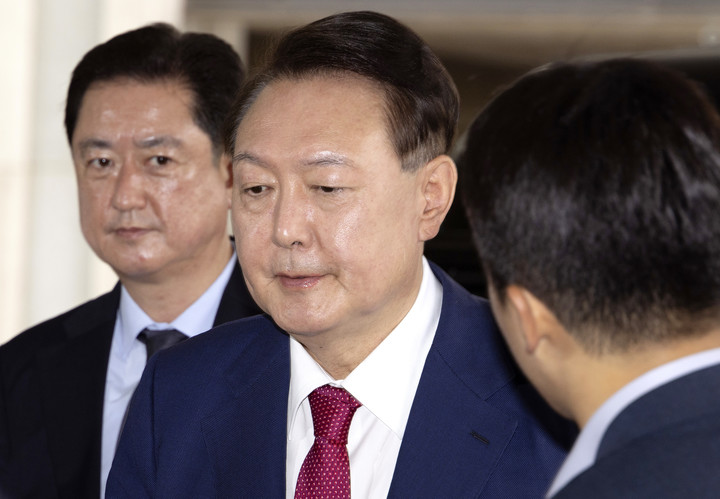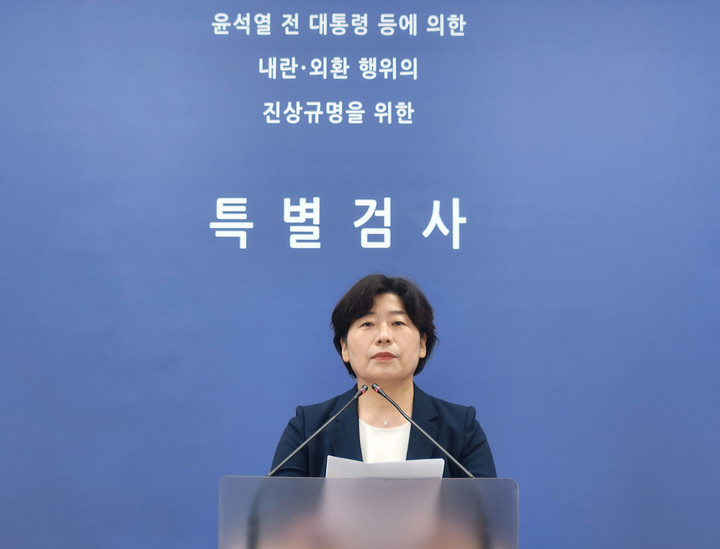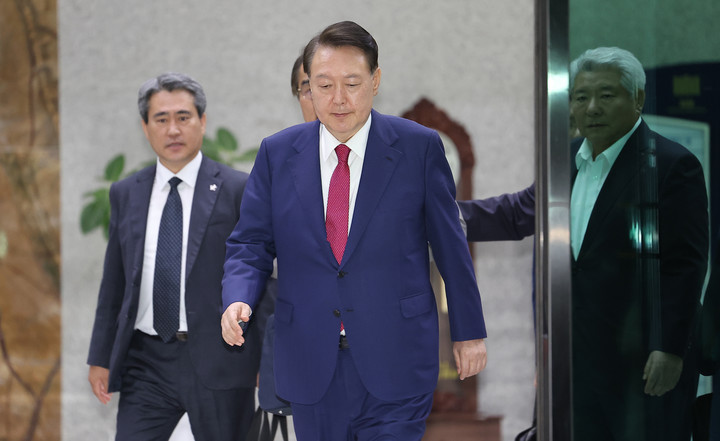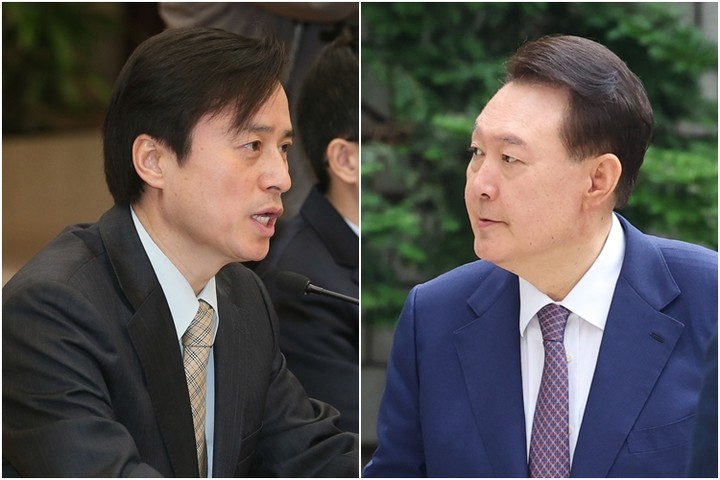Special Counsel Cho Eun-seok Requests Detention Warrant on Expanded Charges, Escalating Political Tensions
Yoon to Attend Critical Warrant Hearing in Person; Decision Expected by Late Night on July 9

Former President Yoon Seok-yeol is once again at a crossroads after just four months since his release, as prosecutors move to have him re-detained.
On July 6, the special investigative team led by Special Counsel Cho Eun-seok announced it had requested a detention warrant against former President Yoon at the Seoul Central District Court. Notably, this move came just 18 days after the special investigation began on June 18—a pace considered highly unusual for such a high-profile case.
The new detention warrant adds several charges to those previously included, such as abuse of power directed at cabinet members, falsification of official documents, and obstruction of public officials in the course of duty. Among the allegations, Yoon is accused of abusing his authority by excluding certain cabinet members from participating in the emergency martial law meeting last December, thereby deliberately hindering their rights to review and vote.
Additionally, investigators assert that Yoon ordered the drafting of a “post-event martial law declaration” to mask legal defects in the original decree. The declaration was signed by former Prime Minister Han Deok-soo and other officials, and then subsequently destroyed—acts now outlined as falsification of official documents and violations of the Presidential Records Management Act.
The warrant application also details Yoon’s direct orders to security agents during the failed attempt to execute the first arrest warrant. The document reportedly cites Yoon instructing staff that “just showing your firearms will intimidate the police,” illustrating a more overt obstruction of law enforcement.
Special Counsel Cho added that the team included allegations that Yoon ordered the deletion of records from encrypted military phones used by senior officials such as former Counterespionage Commander Yeo In-hyeong, in a bid to erase sensitive communications related to the martial law situation.
However, the charge of external rebellion—regarded as central to the entire emergency—is not included in this detention warrant. The special counsel’s office explained that, should they secure physical custody of Yoon, the investigation into allegations such as instructing operations with North Korean drones will proceed in earnest.
This latest warrant request comes 120 days after Yoon’s release on March 8, when a previous arrest was canceled by the court.


Yoon was first detained on January 15 this year after two abortive arrest attempts by the Corruption Investigation Office. He was later indicted on January 26, facing charges as the ringleader of an insurrection, but released on March 8 following the court’s decision to cancel his detention.
Driven by the philosophy that “investigation is war,” Special Counsel Cho has carried out an unusually swift and aggressive investigation, seeking to re-arrest Yoon. Despite the dismissal of a prior warrant, Cho’s team repeatedly summoned Yoon for questioning.
On July 5, Yoon appeared at the special counsel’s office and underwent a second round of face-to-face questioning, which lasted 14 and a half hours, including nearly five hours spent reviewing the written report. Yoon reportedly denied most of the allegations, firmly stating he “did not give such orders.”
A spokesperson for Yoon’s legal team asserted, “Neither witness testimony nor objective evidence proved any of the accusations. This new arrest warrant is an excessive fishing expedition.”
Meanwhile, the Seoul Central District Court announced that Yoon’s pretrial detention hearing will take place at 2:15 p.m. on July 9. Yoon is expected to appear in court in person to present his defense.
The outcome of the hearing will determine whether Yoon is re-detained. The court is expected to make a decision late on July 9 or in the early morning hours of July 10.
If the warrant is granted, the special counsel’s investigation into additional charges—especially those related to external actions—could accelerate. Conversely, if denied, the investigations into the insurrection allegations may lose substantial momentum.
Note “This article was translated from the original Korean version using AI assistance, and subsequently edited by a native-speaking journalist.”

Photo=Yonhap News
추천 뉴스
- 1 Shinhan Bank Marks 43rd Anniversary with Commitment to Customer-Centric Innovation and Social Responsibility Shinhan Bank commemorated its 43rd anniversary on July 7 with a ceremony focused on reaffirming the founding spirit of the bank and highlighting its ongoing dedication to customer-driven innovation and social responsibility. Over 100 employees were in attendance to mark the occasion and to celebrate
- 2 President Lee Meets Cardinal Yoo Heung-sik, Expresses Hope for Papal Visit and Inter-Korean Dialogue President Lee Jae-myung held a meeting with Cardinal Yoo Heung-sik, who is currently visiting Korea, at the Yongsan Presidential Office on the 7th. During the meeting, they discussed the potential visit of Pope Leo XIV to Korea, particularly in light of the upcoming World Youth Day scheduled to take
- 3 BLACKPINK Returns as a Complete Group, Electrifies 70,000 Fans in First Full-Lineup Concert in Two Years BLACKPINK has made a long-awaited return as a full group, igniting the stadium stage with their signature energy and charisma as they launched their new world tour, "Deadline." On July 6 at Goyang Sports Complex Main Stadium in Gyeonggi Province, the group greeted a sea of fans on the second night o
- 4 Lee Sang-min Shares Emotional Struggles After Failed IVF Attempt on My Little Old Boy On the latest episode of SBS’s variety show My Little Old Boy, broadcaster Lee Sang-min openly shared the emotional process of undergoing in vitro fertilization (IVF) with his wife, who is ten years his junior, as the couple faced a difficult outcome.Aired on July 6, the program followed Lee Sang-mi
- 5 E-1 Championship Coaches Voice Determination Ahead of East Asian Cup Kick-Off Ahead of the East Asian Football Federation (EAFF) E-1 Championship, national teams from Korea, China, Japan, and Hong Kong have ramped up training and preparations, each setting their sights on victory.At an official press conference held at Mir Stadium in Yongin on the 6th, the head coaches and pl
- 6 Hanwha Eagles Clinch First-Half KBO Lead with Home Run Show and Wise's 10th Win The Hanwha Eagles have secured the top spot in the first half of the 2025 KBO League, marking a triumphant milestone for the team. On the afternoon of July 6 at Gocheok Sky Dome, Hanwha overwhelmed the Kiwoom Heroes 10-1 in an away game, sealing their first-half lead regardless of the outcomes in th
- 7 Lotte Chairman Shin Dong-bin Presents Trophy to Park Hye-jun at KLPGA Lotte Open Shin Dong-bin, Chairman of Lotte Group, personally presented the winner’s trophy to Park Hye-jun, the champion of the 15th KLPGA Lotte Open, held at Bear’s Best Cheongna Golf Club in Seo-gu, Incheon on July 6.On the day of the event, Chairman Shin toured the Gallery Plaza and Lotte Pleasure Hall wit
- 8 CJ Logistics Launches Official Para Sports Team, Taking On New Challenges Across 10 Disciplines CJ Logistics has officially launched a para sports team, aiming to encourage broader social participation for people with disabilities through sports. The company announced on July 6 that it had signed a partnership agreement with the Seoul Disabled Sports Association on July 3 to promote the develo
- 9 Xdinary Heroes Tease Fiery Comeback with ‘FiRE (My Sweet Misery)’ and Electrifying Band Performance Band Xdinary Heroes has stirred anticipation among fans by unveiling group photos and a sneak peek of their upcoming music video on their official social media channels. Prior to the release, the band showcased a strong, unified image with members Gunil, Jungsu, Gaon, O.de, Jun Han, and Jooyeon, eac
- 10 South Korea’s K-Food+ Exports Surge in First Half of 2025, Topping $6.67 Billion According to data released by the Ministry of Agriculture, Food and Rural Affairs on July 4, South Korea’s K-Food Plus (K-Food+) exports for the first half of 2025 reached a provisional total of $6.67 billion. This marks a 7.1% increase compared to the same period last year.K-Food+ encompasses not o
